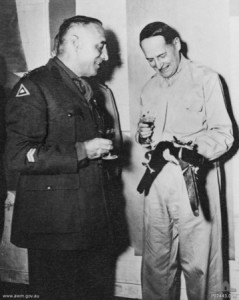I’m writing this while I watch the Anzac Day parade on TV. The ranks are thinning – there’s not many veterans left now.
My grandfather, Nelson Wellington, was a soldier. Well, how could you be anything else with a name like that? He fought in both wars. He was on his way to Gallipoli on 2 September 1915, aboard the Southland with the 21st Battalion, when it was torpedoed by a German submarine. Forty men were lost. Most of the 1400 men on board took to the life boats, but Nelson remained on board with a volunteer crew of stokers and beached the ship at Mudros, a small port on the Greek island of Lemnos. He then served at Gallipoli, both at Lone Pine, and Quinn’s Post, the hairiest place on the peninsula. From Gallipoli he went to the Western Front, where he was wounded at Ypres. He copped a bullet in the lung, which remained there for the rest of his life, because it was too dangerous to remove. He was awarded the Military Cross.
In the second war he was the Commanding Officer of the 2nd/2nd Pioneers, and fought the Vichy French in Syria. Again he was wounded by a piece of shrapnel which shattered his right elbow. The Pioneers took their objective, a small fort at Merdjayoun, and Nelson was awarded the DSO. He was evacuated to the 7th Australian General Hospital where my Father was working. My Mother tells the story in her Memoirs of how bad news arrived by telegram, delivered by the local postmaster. When the postmaster turned up on her doorstep with the dreaded telegram she simply asked: “My husband or my Father?” Nelson had to step down as CO, but fortunately avoided the fate of the Pioneers who were captured by the Japanese in Java and spent the war as POWs, with many ending up on the Burma Railway.
After convalescence and return to Australia Nelson was appointed Australian Liaison Officer to General Douglas Macarthur. But his war was still not over. He was sent on a secret mission to investigate the formation of a paratroop unit to be used in the New Guinea campaign. The plane he was in crash landed at Rockhampton airport and burst into flames. The airstrip was next to a convent and some nuns rushed out and dragged him from the burning wreckage. After his recovery he was convinced the nuns had saved his life and he converted to Roman Catholicism.
Nelson had a stroke and collapsed with a thud on the floor of our bathroom in 1952. He died without regaining consciousness three days later in Dandenong Hospital. He had seen a lot of war. He was just 63.
It’s hard not to feel emotional on Anzac Day.……….at the going down of the sun and in the morning, we will remember them.
It’s a corny and hackneyed phrase, but still appropriate. Lest We Forget.
I’m off to Flemington now.




Please could you contact me about Nelson Wellington as I am writing a history of the 2/2 Pioneers.